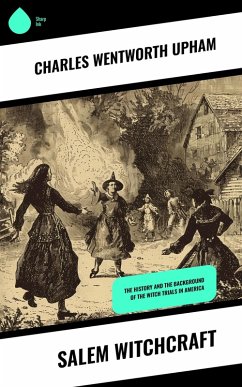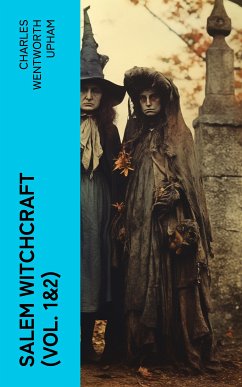
Salem Witchcraft, Volumes I and II (eBook, ePUB)
With an Account of Salem Village and a History of Opinions on Witchcraft and Kindred Subjects

PAYBACK Punkte
0 °P sammeln!
In "Salem Witchcraft, Volumes I and II," Charles Wentworth Upham meticulously chronicles the infamous Salem witch trials of 1692, offering a detailed examination of the socio-political and religious factors that fueled this historical calamity. Upham employs a scholarly prose that combines narrative storytelling with rigorous historiographical analysis, revealing the complexities and tragedies intertwined with the witchcraft accusations. His work remains a pivotal study in American history, reflecting the pervasive fears and superstitions that can lead societies to moral panic and injustice, t...
In "Salem Witchcraft, Volumes I and II," Charles Wentworth Upham meticulously chronicles the infamous Salem witch trials of 1692, offering a detailed examination of the socio-political and religious factors that fueled this historical calamity. Upham employs a scholarly prose that combines narrative storytelling with rigorous historiographical analysis, revealing the complexities and tragedies intertwined with the witchcraft accusations. His work remains a pivotal study in American history, reflecting the pervasive fears and superstitions that can lead societies to moral panic and injustice, thus encapsulating the broader Puritanical context of early New England society. Charles Wentworth Upham was a prominent historian, politician, and clergyman, with deep roots in New England culture. His passion for understanding the interplay of religion, law, and social dynamics in colonial America can be traced to both his educational background and his personal ties to the region. Upham's dedication to uncovering the truth behind historical events was reflected in his extensive research, and he sought to provide a detailed account that would serve as both a warning and a source of understanding for future generations. Upham's "Salem Witchcraft" is highly recommended for scholars, students, and anyone captivated by the intricacies of human behavior during crises. This monumental work not only sheds light on a dark chapter of American history but also serves as a cautionary tale about the dangers of hysteria and the fragility of justice in society.
Dieser Download kann aus rechtlichen Gründen nur mit Rechnungsadresse in A, B, BG, CY, CZ, D, DK, EW, E, FIN, F, GR, H, IRL, I, LT, L, LR, M, NL, PL, P, R, S, SLO, SK ausgeliefert werden.













